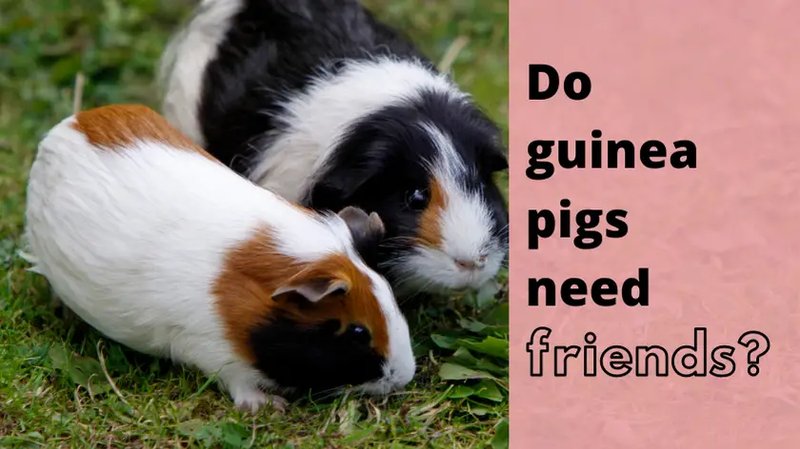
Guinea pigs are naturally social animals. In the wild, they live in groups, foraging and playing together. Bringing a guinea pig into your home means taking on a responsibility that goes beyond just feeding and cleaning. So, do guinea pigs really need a friend? Here’s the scoop on their social nature and why companionship matters.
Understanding the Social Nature of Guinea Pigs
Guinea pigs are social by nature. They’re not like cats or dogs that can sometimes enjoy some alone time. Instead, these little guys thrive in groups. In the wild, they form communities for protection and companionship. Think of it as living in a big family or a close-knit group of friends. When you add a guinea pig to your home, you’re stepping into that role of family, but it’s essential to recognize they may need company from their own kind too.
Without a buddy, guinea pigs can become stressed or lonely. You might notice signs like constant chattering or even aggressive behavior towards their cage mates. This is their way of communicating feelings of anxiety or boredom. Imagine sitting alone in a room while everyone else is having a party—you’d feel pretty left out. That’s why it’s so important to consider getting a second guinea pig if you’re thinking of adopting one.
Benefits of Having a Companion for Your Guinea Pig
So, why should you think about getting a second guinea pig? There are numerous benefits to having a buddy for your furry friend. Here are a few key reasons:
- Improved Mental Health: Just like humans, guinea pigs can experience feelings of isolation. A companion can help alleviate some of that loneliness, leading to a happier, more content pet.
- Natural Behaviors: With a friend, guinea pigs will engage in natural behaviors like grooming each other, playing, and cuddling. It’s fascinating to watch, and it helps keep them active and stimulated.
- Lower Stress Levels: Companionship can help reduce stress. A buddy provides comfort, especially during loud noises or stressful situations like vet visits.
You might be wondering if it’s easy to introduce a new guinea pig into your home. While it can require some effort, the benefits usually outweigh the challenges. It can take time for them to bond, but with patience, you’ll be rewarded with a happier pair of pets.
Choosing the Right Companion
If you decide to bring another guinea pig into your home, it’s crucial to choose the right companion. Not all guinea pigs are compatible, just like people have different personalities. Here are some tips for finding the best match:
1. Same Sex: To avoid unwanted babies, make sure the guinea pigs are the same sex.
2. Similar Ages: Trying to pair a baby guinea pig with an older one can lead to issues. They might not get along due to energy differences.
3. Temperament Compatibility: Look for a guinea pig that has a similar temperament. If you have a shy guinea pig, a bold one might not be the best match.
Just remember, the introduction phase is critical. You should set up a safe environment where they can meet for the first time without any barriers. Sometimes, they may squabble at first, which is normal. With time, they’ll likely become best buddies.
How to Introduce a New Guinea Pig
Bringing a new guinea pig home is exciting, but the introduction process is key. Here’s how to do it smoothly:
1. Quarantine: For the first week, keep the new guinea pig in a separate cage to make sure they’re healthy and to avoid spreading any diseases.
2. Neutral Territory: After a week, consider introducing them in a neutral area, like a playpen. This prevents territorial disputes that could occur if one guinea pig feels like their home is being invaded.
3. Supervised Meetings: Allow them to meet for short periods at first, gradually increasing the time they spend together. Watch for signs of aggression or fear, and separate them if needed.
With patience and careful monitoring, your guinea pigs will hopefully bond and become best friends. It can be a beautiful thing to witness!
Signs Your Guinea Pig is Lonely
It’s important to recognize when your guinea pig might be feeling lonely. Here are some signs to watch for:
– Excessive Whining or Chattering: If your guinea pig is making a lot of noise, it could be a call for companionship.
– Lethargy: A lonely guinea pig may lose interest in playing or even eating.
– Aggression Towards You or Cage Mates: If they’re acting out, it may be a cry for attention or a sign of frustration.
If you notice any of these behaviors, it might be time to reconsider the social setup of your pets. Remember, a happy guinea pig is a social guinea pig!
Alternatives to Getting a Second Guinea Pig
If you’re not able to bring another guinea pig into your home, there are a few alternatives that might help keep your pet engaged:
– Interactive Playtime: Spend more time with your guinea pig outside their cage. They love to explore and socialize with you!
– Toys and Enrichment: Provide plenty of toys, tunnels, and chew items to keep them mentally stimulated. Rotate these regularly to keep things fresh and exciting.
– Scheduled Playdates: If you have friends with guinea pigs, consider arranging playdates. Make sure to supervise them during these interactions.
While these alternatives can help, remember that nothing truly replaces the bond of a second guinea pig.
In the end, the answer to “Do guinea pigs need a friend?” is a resounding yes! Their social nature is ingrained, stemming from their wild predecessors who thrived in groups. Whether you choose to adopt a second guinea pig or find other ways to enrich your pet’s life, remember that companionship plays a crucial role in their happiness and well-being.
So, if you’re welcoming one of these delightful creatures into your life, consider their needs as social animals. It’s all about creating a joyful environment, not just for them but for you as well. After all, sharing those little moments of joy, like watching them cuddle or play, is what makes having guinea pigs such a rewarding experience.

